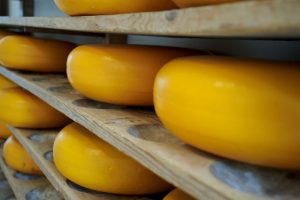Fermentation offers food producers infinite possibilities
Bacteria, fungi, yeast, algae… Although it’s not something we’re aware of every day, much of what we eat and drink is processed by these microscopic organisms. Fermentation is the natural process which determines the flavour, aroma, colour, nutritional value and shelf-life of many products. As a process it offers food producers infinite possibilities, only a fraction of which are currently being used.
Circular economy
The food industry is also moving toward the circular economy, and fermentation is in line with this development as it enables companies to replace chemical substances in food by natural ones. In fermentation, micro-organisms connect small molecules and convert them into more complex compounds.
Nature provides us with a wide range of micro-organisms to choose from if, for example, we would like to make a specific fatty acid for a certain application. We can stimulate this process by switching some fermentation processes on or off, often without having to introduce foreign DNA. This way we can produce a number of components that may be of interest to food producers, such as cultures for organic cheese that contribute to a fuller flavour and extend its shelf-life. Another example is naturally produced folic acid as an additional ingredient in yoghurt, produced by specific bacteria. Or tasty fruit juice that is not packed with sugar because part of the sugar has been removed by means of fermentation.

Fermentation as alternative for chemical food ingredients
The perspective for fermentation as an alternative to the production of chemical food ingredients is favourable and dovetails with the social goal of being less dependent on fossil raw materials. Nonetheless I see that investments by major companies in the food industry still focus on improving existing chemical products. Especially in sectors where the margins are minimal such as the dairy industry, there is very little willingness to invest in new technology.
Major players prefer to let start-ups develop new ideas and then purchase them once they’ve proven successful. I don’t think this is the most efficient approach as the road for start-ups from proof of principle to an applicable concept is long and winding. Many interesting concepts perish before they reach the finish line because the step from laboratory to pilot scale is simply too costly.
Putting nature to work
My advice to companies in the food industry is to not wait for ideas to fall into their laps but spend part of the R&D budget on developing natural ingredients and products. It is often possible to develop a similarly or more affordable and qualitative alternative, especially with products for which consumers are willing to pay a little extra. And all we have to do is put nature to work.
Please leave a comment below.
~written by Jeroen Hugenholtz

